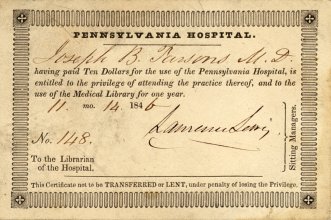 Library
card dated Nov. 14, 1846 for the
Pennsylvania Hospital Library, the oldest
medical library in the United States. It was founded in 1762.
Library
card dated Nov. 14, 1846 for the
Pennsylvania Hospital Library, the oldest
medical library in the United States. It was founded in 1762.The Library History Buff
Promoting the appreciation, enjoyment, and preservation of library history
Vintage Library Cards (also called library tickets)
 Library
card dated Nov. 14, 1846 for the
Pennsylvania Hospital Library, the oldest
medical library in the United States. It was founded in 1762.
Library
card dated Nov. 14, 1846 for the
Pennsylvania Hospital Library, the oldest
medical library in the United States. It was founded in 1762.
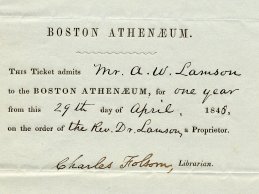 1848 Library Ticket for Boson Athenaeum. Click
here for more information.
1848 Library Ticket for Boson Athenaeum. Click
here for more information.
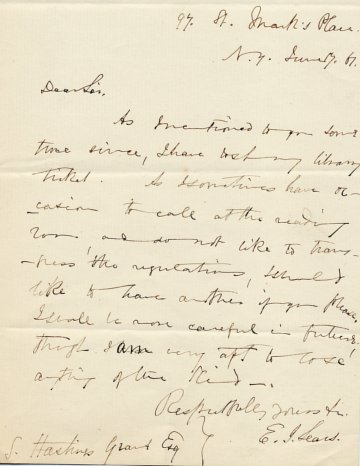
This letter was written by Edward I. Sears on June 7, 1861 to S. Haskins Grant, Librarian of the New York Mercantile Library from 1849 until 1866. Sears was a well known writer and editor of the National Quarterly Review. In the letter Sears writes: “As mentioned to you some time since, I have lost my library ticket. As sometimes have occasion to call at the reading room, I do not like to transgress ‘the regulations,’ I would like to have another if you please. I shall be more careful in future. Though I am very apt to lose anything of the kind.” This letter illustrates that a library card or ticket was an essential ingredient to any substantial library's charging or circulation system. At the time the New York Mercantile was using a ledger system, the predominant charging system for libraries up to the 1850s. This system, however, was not satisfactory for an active library. Just prior to Grant's resignation as Librarian of the New York Mercantile Library, the library implemented a temporary slip system. The lending transaction was recorded on the slip instead of a ledger, and the slip was disposed of when a book was returned.
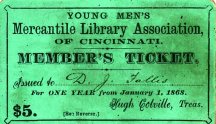
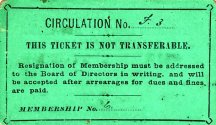
Front and back of an 1868 library ticket (card) for the Young Men's Mercantile Library Association of Cincinnati.
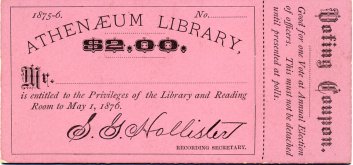
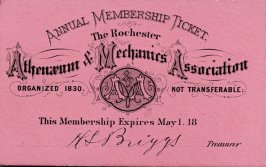 Front
and back of an unused 1876 library card for the Rochester (NY) Athenaeum &
Mechanics Association.
Front
and back of an unused 1876 library card for the Rochester (NY) Athenaeum &
Mechanics Association.
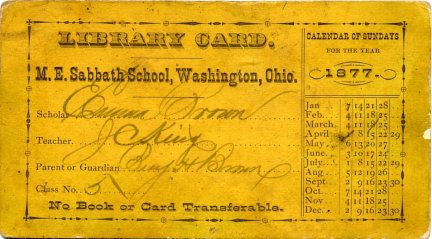 This
library card is for a Sabbath school library dating from 1877. Sabbath
school libraries were one of the many kinds of public library forerunners that
existed in the 18th and 19th centuries.
This
library card is for a Sabbath school library dating from 1877. Sabbath
school libraries were one of the many kinds of public library forerunners that
existed in the 18th and 19th centuries.
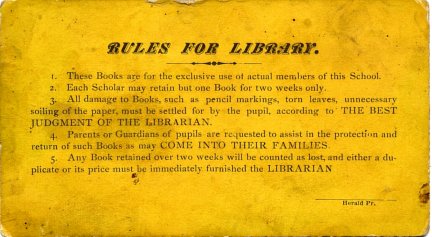 Back
of card above.
Back
of card above.
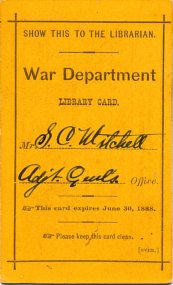
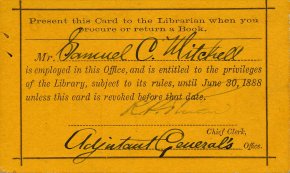 A library card for the War Department Library expiring on
June 30, 1888.
A library card for the War Department Library expiring on
June 30, 1888.
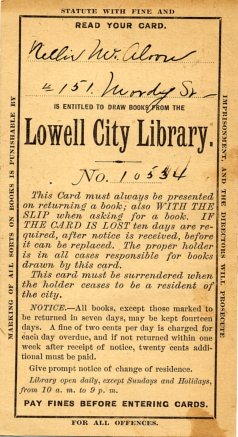
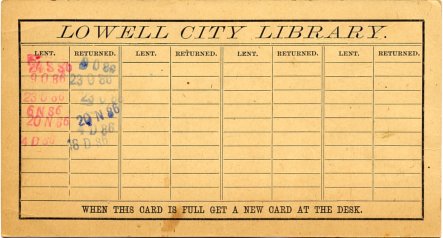
A library card for the Lowell City Library in Massachusetts used in 1886. The card states: "Marking of All Sorts on Books is Punishable by Statute With Fine and Imprisonment, and the Directors will Prosecute". They didn't mess around.
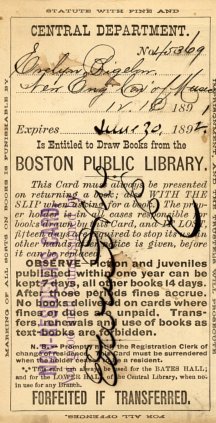 A
library card for the Boston Public Library expiring on June 30, 1892.
A
library card for the Boston Public Library expiring on June 30, 1892.
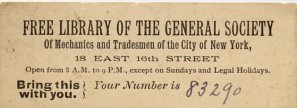 This
card includes only the holder's number.
This
card includes only the holder's number.
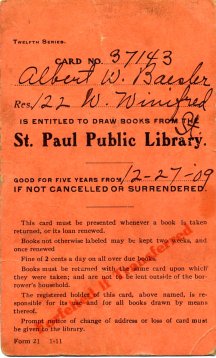
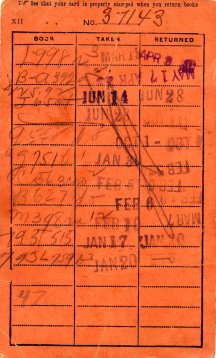
Front and back of a 1909 library card for the St. Paul (MN) Public Library.
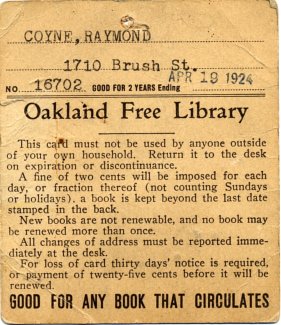
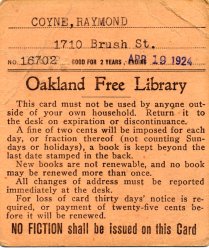 Two
library cards for the Oakland (CA) Free Library for the same person that end on
April 19, 1924. One card is "Good For Any Book That Circulates" and "No Fiction
shall be issued" on the other card. Don't quite understand why there is a need
for two.
Two
library cards for the Oakland (CA) Free Library for the same person that end on
April 19, 1924. One card is "Good For Any Book That Circulates" and "No Fiction
shall be issued" on the other card. Don't quite understand why there is a need
for two.
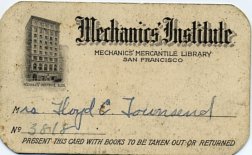 Library card for the San Francisco Mechanics' Institute
Library. Date of issue unknown but probably in the 1920s or 30s.
Library card for the San Francisco Mechanics' Institute
Library. Date of issue unknown but probably in the 1920s or 30s.
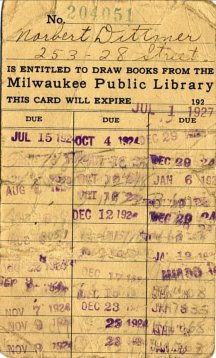 A
well used library card expiring on July 1, 1927 for the Milwaukee Public
Library.
A
well used library card expiring on July 1, 1927 for the Milwaukee Public
Library.
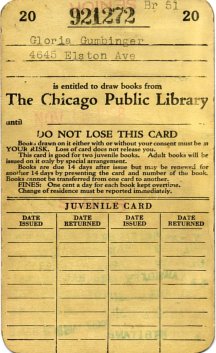 Library
card for the Chicago Public Library used in the 1920s.
Library
card for the Chicago Public Library used in the 1920s.
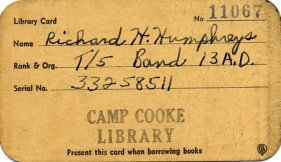 Library
Card for Camp Cooke (Texas) Library circa World War II. The Army's 13th
Armored Division along with other armored and infantry divisions was trained at
Camp Cooke. Army libraries were a legacy of the
American Library Association's Library War Service
in WWI.
Library
Card for Camp Cooke (Texas) Library circa World War II. The Army's 13th
Armored Division along with other armored and infantry divisions was trained at
Camp Cooke. Army libraries were a legacy of the
American Library Association's Library War Service
in WWI.
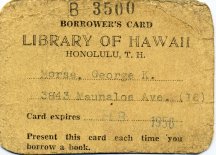 Library
card for the Library of Hawaii in Honolulu, Territory of Hawaii expiring in
February, 1956.
Library
card for the Library of Hawaii in Honolulu, Territory of Hawaii expiring in
February, 1956.
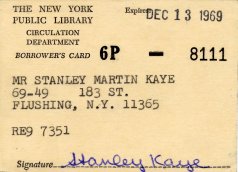 Library
card for the New York Public Library expiring December, 1969.
Library
card for the New York Public Library expiring December, 1969.
To see some more current library cards with a personal connection CLICK HERE.
This site created and maintained
by
Larry T. Nix
Send comments or questions to
nix@libraryhistorybuff.org
Last updated: 12-29-14
© 2005-2014 Larry T. Nix
Also check out the
Library History Buff Blog.